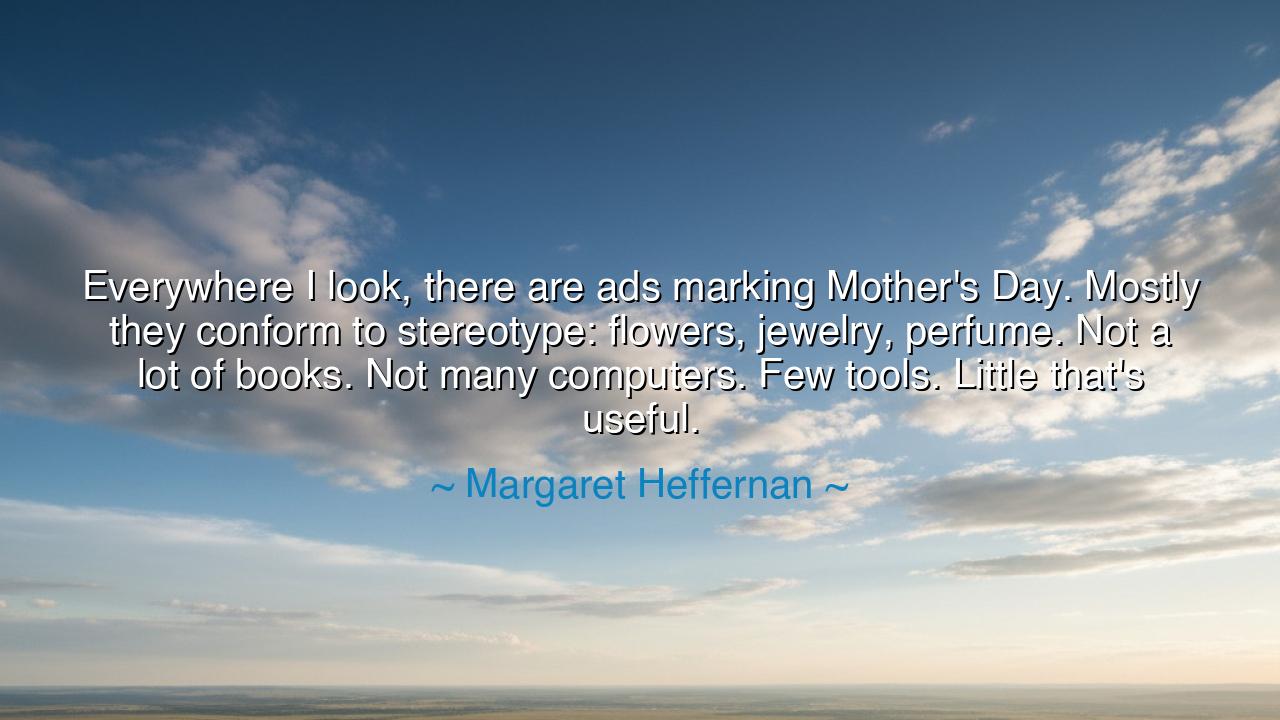
Everywhere I look, there are ads marking Mother's Day. Mostly
Everywhere I look, there are ads marking Mother's Day. Mostly they conform to stereotype: flowers, jewelry, perfume. Not a lot of books. Not many computers. Few tools. Little that's useful.






The thinker and writer Margaret Heffernan, known for her insight into human behavior and leadership, once observed with quiet fire: “Everywhere I look, there are ads marking Mother’s Day. Mostly they conform to stereotype: flowers, jewelry, perfume. Not a lot of books. Not many computers. Few tools. Little that’s useful.” At first, her words may seem a gentle critique of modern marketing, but beneath their surface lies a powerful meditation on respect, wisdom, and the narrow roles society still casts upon women—especially mothers. Heffernan was not condemning gifts, but questioning the deeper meaning of how we honor the ones who gave us life. In her lament, she calls for a revolution of thought: to see mothers not as ornaments of affection, but as builders of intellect, strength, and purpose.
Her words emerge from a long lineage of truth-seekers who have resisted the comfort of convention. In the old world, mothers were revered not for their beauty, but for their wisdom, their endurance, and their power to shape generations. Yet over time, as society grew distracted by the glitter of material wealth, this reverence became adorned with sentimentality. The flowers, jewelry, and perfume that Heffernan names are symbols of sweetness—ephemeral and fragile, like the blossoms that fade in a day. But she hungers for something deeper: gifts that nourish the mind, that recognize women as creators not just of life, but of thought, invention, and change.
When Heffernan says there are “not a lot of books, not many computers, few tools,” she speaks for every woman whose intellect has been underestimated. She points to the imbalance between image and substance, between being cherished and being respected. The gifts that the world offers to mothers, she suggests, reveal what the world expects of them. To give a woman perfume is to adorn her; to give her a book is to honor her mind. To offer her a tool or computer is to affirm her power to build, to create, to contribute beyond the boundaries of the household. In these distinctions lies the essence of Heffernan’s wisdom—a call to awaken from the sleep of stereotype and recognize the full humanity of women.
History, too, bears witness to this truth. Consider Hypatia of Alexandria, the brilliant philosopher and mathematician of ancient Egypt. In a world ruled by men, she taught astronomy, philosophy, and science; her mind shone brighter than any jewel, her ideas outlasted any flower. Yet her legacy was nearly lost, crushed by ignorance and fear. Hypatia reminds us, as Heffernan does, that societies rise or fall according to how they treat their thinkers—and how they recognize the wisdom of their women. To offer Hypatia perfume instead of a scroll, or jewelry instead of a compass, would have been an insult to her spirit. So too, when we reduce motherhood to sentiment and decoration, we forget that mothers are architects of civilization, not mere symbols of tenderness.
Heffernan’s observation also mirrors a broader cultural truth: that modern celebration often masks a deeper forgetfulness. We are quick to honor the image of motherhood—the smiles, the softness—but slow to support the reality of it: the labor, the sacrifice, the endless giving of energy and thought. The “useful” gifts she longs for—books, tools, instruments of creation—are metaphors for the respect and empowerment women deserve. To give a mother a book is to tell her, “Your mind matters.” To give her a tool is to say, “You build the world, not just the home.” Such gestures restore balance to a society that too often equates femininity with fragility.
The lesson, then, is both simple and profound: love must never become condescension, and honor must never become habit. When we celebrate the women who raise, teach, and guide us, let our gifts be not only symbols of affection but acts of recognition. Give flowers, yes—but also give freedom. Give gratitude, but also give opportunity. Ask not only what makes a mother happy, but what makes her powerful, what strengthens her body, mind, and soul.
So, my children of the modern age, remember Margaret Heffernan’s wisdom. The true measure of gratitude is not how sweetly we praise, but how deeply we understand. See beyond the perfume and the petals; see the strength that labors, the mind that questions, the will that endures. Honor not only the gentleness of motherhood, but its intellect, creativity, and resolve. For when we give to our mothers the tools of learning and creation, we do more than please them—we restore the dignity of all who give life, and we ensure that the future they built for us will continue to bloom in truth, not in illusion.
And thus, let every Mother’s Day become not a ritual of buying, but a ritual of remembering: that behind every gentle smile is the courage of a thousand battles, and behind every quiet act of love, the wisdom that sustains the world.






AAdministratorAdministrator
Welcome, honored guests. Please leave a comment, we will respond soon